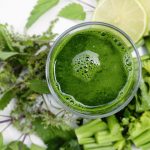Iron is a mineral that is essential for the human body to function properly. It is a crucial component of hemoglobin, a protein found in red blood cells that carries oxygen from the lungs to the rest of the body. Iron also plays a role in energy production, brain function, and immune system health. Without enough iron, the body cannot produce enough healthy red blood cells, leading to anemia and other health problems.
Benefits of Iron
 Iron has numerous health benefits for the body. One of the most well-known benefits is improved energy levels. Iron helps transport oxygen throughout the body, which is necessary for energy production. Without enough iron, the body may feel fatigued and weak.
Iron has numerous health benefits for the body. One of the most well-known benefits is improved energy levels. Iron helps transport oxygen throughout the body, which is necessary for energy production. Without enough iron, the body may feel fatigued and weak.
Iron also plays a role in brain function. Studies have shown that iron deficiency can lead to cognitive impairment and poor memory function. Additionally, iron is important for immune system health. It helps produce white blood cells, which are responsible for fighting off infections and diseases.
Sources of Iron
There are two types of dietary iron: heme and non-heme iron. Heme iron is found in animal products such as meat, poultry, and seafood. Non-heme iron is found in plant-based foods such as beans, lentils, spinach, and fortified cereals.
To maximize iron absorption from food, it is important to pair iron-rich foods with vitamin C-rich foods such as citrus fruits or bell peppers. Cooking with cast iron pans can also increase the amount of iron in your food.
Iron Deficiency
Iron deficiency is a common nutritional deficiency worldwide, affecting an estimated 1-2 billion people. It occurs when the body does not have enough iron to produce healthy red blood cells.
There are several causes of iron deficiency, including poor diet, pregnancy or breastfeeding, heavy menstrual periods, gastrointestinal disorders such as celiac disease or inflammatory bowel disease, and certain medications that interfere with iron absorption.
Symptoms of Iron Deficiency
The symptoms of iron deficiency can vary from person to person, but common signs include fatigue, weakness, pale skin, shortness of breath, dizziness, and headaches. In severe cases, iron deficiency can lead to anemia, a condition in which the body does not have enough healthy red blood cells to carry oxygen to the tissues.
Tips for Increasing Iron Intake
There are several practical tips for increasing iron intake. Eating a balanced diet that includes a variety of iron-rich foods is key. Cooking with cast iron pans can also increase the amount of iron in your food. Pairing iron-rich foods with vitamin C-rich foods can also help maximize absorption.
Additionally, avoiding foods and drinks that inhibit iron absorption such as coffee and tea can help increase iron levels in the body.
Foods High in Iron
There are many foods that are high in iron. Animal products such as beef, chicken, and seafood are excellent sources of heme iron. Plant-based sources of non-heme iron include beans, lentils, tofu, spinach, and fortified cereals.
Some examples of iron-rich meals include a spinach salad with grilled chicken and strawberries or a lentil soup with tomatoes and bell peppers.
Supplements to Consider
Iron supplements may be necessary for individuals who are unable to get enough iron from their diet alone or who have been diagnosed with anemia or iron deficiency. There are several types of iron supplements available including ferrous sulfate, ferrous gluconate, and ferrous fumarate.
It is important to talk to a healthcare provider before starting any new supplement regimen as too much iron can be harmful.
Iron is an essential mineral that plays a crucial role in many bodily functions. It is important to prioritize iron intake through a balanced diet that includes a variety of iron-rich foods. For individuals who are unable to get enough iron from their diet alone, iron supplements may be necessary. By taking steps to increase iron intake, individuals can improve their energy levels, brain function, and immune system health.








